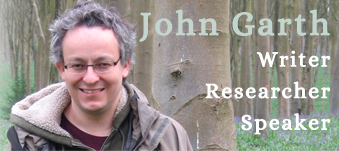Tolkien and the Great War: The Threshold of Middle Earth by John Garth Harper
- Home
- World War I Book Reviews
- Tolkien and the Great War: The Threshold of Middle Earth by John Garth Harper

Collins, 398pp, 15 plates, 2 maps, £20. ISBN -00-711952-6.
Take it or hate it, The Lord of the Rings remains a fascinating phenomenon. Tolkien's educated fantasies have influenced an entire genre, whose outpourings now relegate allied, and perhaps equally testing, mainstream science fiction to subsidiary sections of bookshops. John Garth's major biographical study of J.R.R. Tolkien, the first since 1977 highlights his view that the author's first hand experiences of the 1914- 1918 war opens the door to a fuller understanding of the man and his world of Middle-Earth. It claims, convincingly, that whilst the scholarly fantasist's contemporaries surrendered to disillusionment, he kept enchantment alive, reshaping an entire literary tradition into a form that resonates to this day'.
Tolkien and the Great War is the result of five years' research by its journalist author. In drawing together his twin great interests - the work of the creator of the Hobbits and the Great War - he presents readers with an enigma. For, I suspect that many fascinated by the long study of Tolkien's philological development — and his fathomless fascination with early European myth and legend - will find John Garth's analysis of the author's war of equal interest. And vice versa. Certainly, those lacking a deep interest in the precedents to the Middle- Earth trilogy are likely to find that the first and the last thirds of the book inform them too well about the development of Tolkien's poetry, myth creation and ideas.

Yet Garth's recreation of Tolkien's military career, and his service as a regimental signals officer during the battles of the Somme, is well especially well realised. The author has researched, read widely and well to provide both the colour and the texture of his subject's military career (paying credit to, amongst others, three WFA stalwarts: Michael Steadman, the late Alf Peacock and the now ubiquitous Paul Reed). Equally fascinating is Garth's story of the military careers of the three close friends of great promise with whom Tolkien developed - and on whom he tested - his creative thoughts, ideas and carefully crafted mythic poetry; two of whom died in action in France. Throughout, the back-story remains the pitiless intellectual commitment which Tolkien directed toward the creation of his fantastical worlds of dreams; commitment always backed by a genuine scholarship which enabled him to create new languages, borrow from legend and finally create Middle-Earth. Whilst the Great War clearly did not trigger Tolkien's creativity, as John Garth reveals, it failed to stem it and influenced writing which continues to fascinate new generations. Tolkien and the Great War is a valuable addition to the still growing body of biography of writers forged, shaped or merely influenced by the Great War.
Review by David Filsell
[This review first appeared in our journal Stand To! No.70 April 2004. Members receive Stand To! three times a year along with three copies of our in-house magazine Bulletin. The entire archive of Stand To! is available to members via their Member Login].





